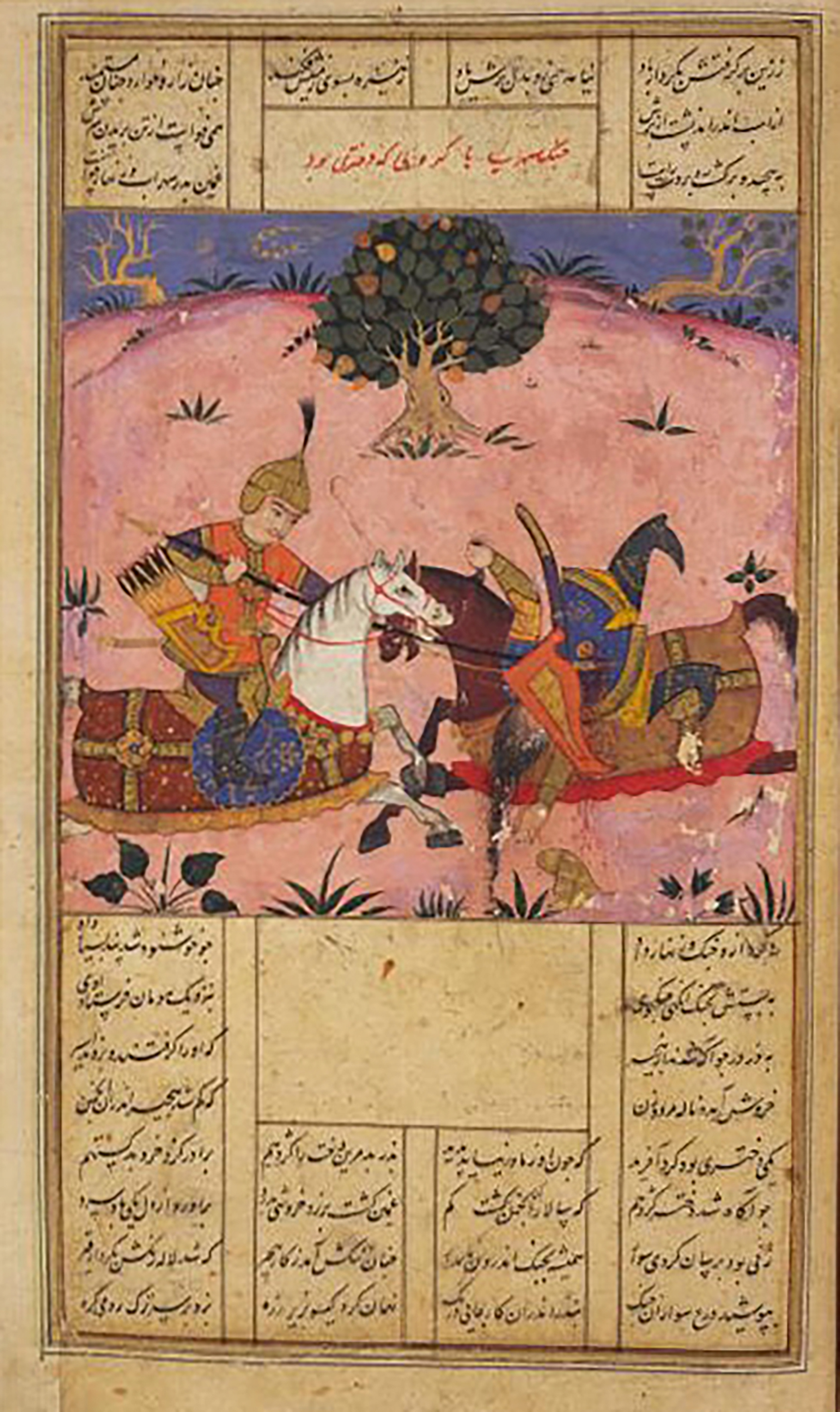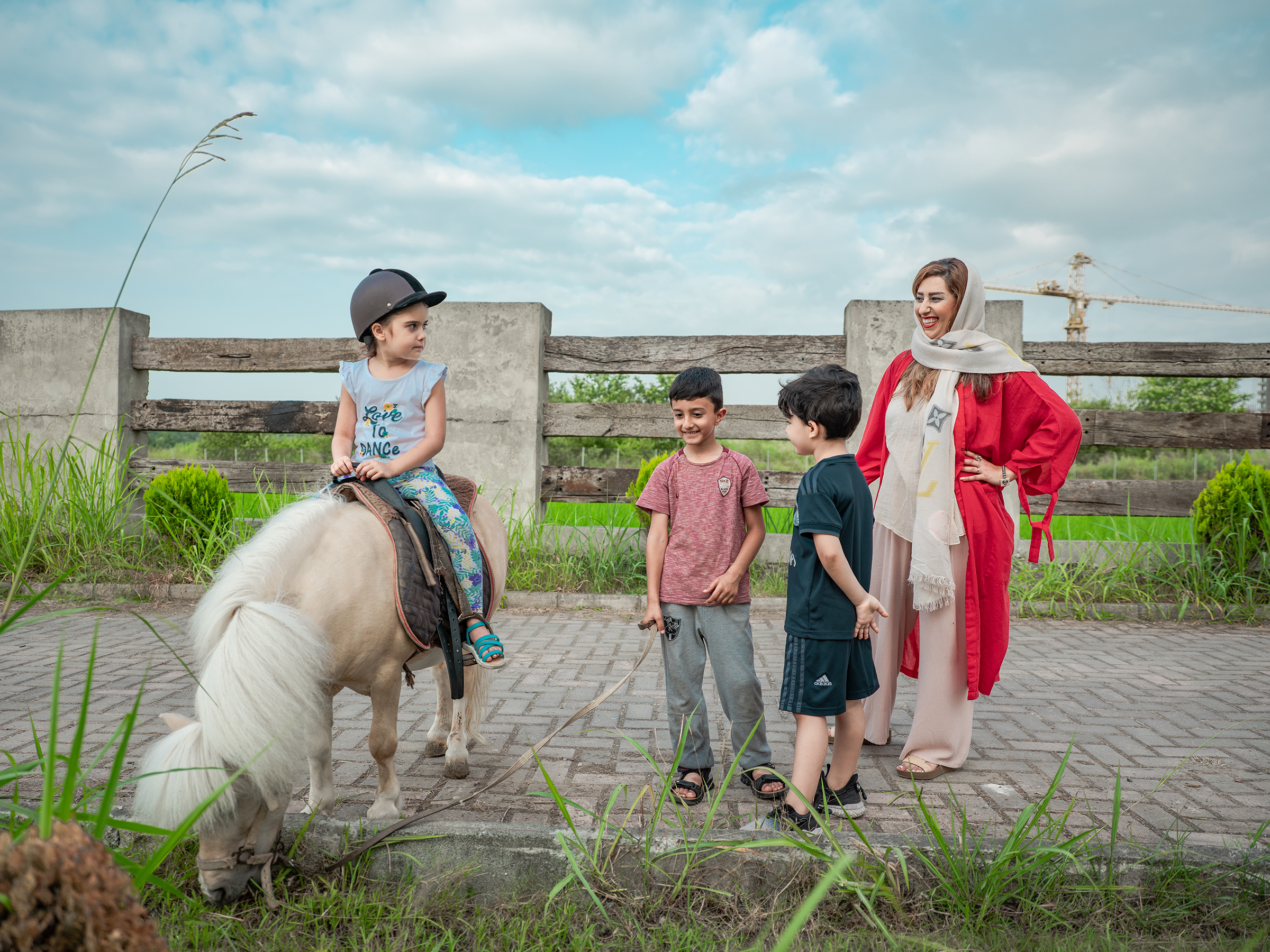Earlier this summer I drove my 12-year-old daughter to a horseback riding camp near Missoula, Montana. But before she was allowed to ride, the instructor wanted to talk about how horses can help people heal from trauma. “Trauma is intergenerational,” the instructor told her. I turned the words over in my head as I stood by my vehicle, wearing a pair of my grandmother’s cowgirl boots.
I thought of my grandmother as a child in Iran, nuzzling a Caspian horse in a glen several miles from her home, terrified and shaking, knowing that it wasn’t safe to return to her abusive father and the arranged marriage that awaited her. I also thought of her mother, my great-grandmother, appearing as if out of a mirage to reveal that she, too, was a horsewoman, to share with my dumbstruck grandmother the legacy of fierce horsewomen in their family extending back to the days of The Persian War.
Growing up, a favorite book in our Iranian-American household was the Persian epic, the Shahnameh or “Book of Kings.” Penned by Ferdowsi in 977 BCE, the 50,000 word poem tells the story of the Persian Empire across thousands of years. And while it focuses on many of the great male heroes of our culture, my favorite stories were of the women warriors. In particular, I loved the story of Gordafarid, the Persian princess who bested Sohrab, the strongest soldier in the Turanian army, while astride a powerful Caspian horse. Her victory thwarted the Truanian troops marching on Persia.

My grandmother was the living embodiment of Gordafarid. Born and raised on a farm near the Caspian Sea, her life story was deeply intertwined with the legacy of the Caspian horse – the oldest living breed of horses on the planet today – as well as, strange as it may sound, the War on Terror. She did not live to experience that war, but her life’s work impacted its trajectory decades later. In the 1950s my grandmother began helping female survivors of domestic violence by smuggling them out of Iran and into Afghanistan on sure-footed and even-tempered Caspian horses. To calm the nerves of both riders and equines as they approached treacherous border crossings, my mother fed the horses homemade spirits -- whiskey or vodka -- occasionally slipping a few sips to their frayed riders as well. These women joined an all-female army in the caves of Northern Afghanistan.
The secret to defending their homelands? The horses and their relationship with them. These horses were built for the rocky terrain with shorter legs that can navigate the uneven terrain and sure-footed hooves to accommodate steep cliffs. The horsewomen built such a solid relationship that the equines that they could ride them hands free, weapons drawn, and trust them to keep them safe during battle against warlords in Afghanistan and Iran, as well as Soviet invaders. Fifty years later, these horses would be used by American Green Berets as they fought alongside the women and men of Iran and Afghanistan against the Taliban in the months and years after 9/11.
When my grandmother spoke of these majestic animals, she spoke of freedom, focus, and strength.
Like my ancestors before me, the strength and resilience I have found in my life to move forward while not forgetting my past has come from the horses. And just as it was for my grandmother and the dozens of women she helped rescue to build an all-female army in Afghanistan, the horse for me also represents freedom, defiance, and a powerful but quiet strength. I know that we live with the intergenerational trauma of domestic violence, abuse, revolution, and war. This is a part of my history too. But when it comes to horses and my grandmother’s legacy, it isn’t intergenerational trauma that comes to mind, but intergenerational strength. I only met my grandmother once, as a child. But her words reverberate in my bones to this day: You have the strength of thousands of years of women warriors coursing through your veins. Never forget how strong you are. Four decades later, across continents and oceans, I hear my grandmother’s voice and the pounding of the hooves of those rare, perfect Caspian horses.


“Mama! I! Am! Flying!” My thoughts are interrupted by the sound of galloping hooves and shouts of delight. My daughter once told me, “If I’m going to ride, Mom, I’m going to ride free.” Unknowingly, she was echoing the same words I spoke the first time I mounted a horse in my ancestral homeland some twenty years earlier. My first trip to Iran was as a journalist journeying home to write stories about the Iranian women’s movement. But that journey was also marked by falling in love with a culture, a country, and a people that I had only imagined growing up. It was also the first time in my life I was able to connect with horses and begin to learn the braided legacy of women and horses that was part of my story.
My children, like me, see horses not as creatures to be dominated or as an animal to carry their trauma, but as extensions of themselves – versions of them who can fly freely. Whose majesty is a quiet power, unyielding but steadying, free but focused. And the Caspian horse tells the story of our ancestors, of the Persian empire of women who would not be dominated and who used their strength to build empires and legacies, and to seek justice: Women who knew how to defend against some of the world’s most elusive enemies, from Soviet armies to warlords to the Taliban. Women who continue to push back against oppression in all its forms, despite the very real threat of death.
The blood of generations of horsewomen warriors courses through my veins and through my children’s. This is the legacy we inherited, and that we get to pass on to the next generation. It isn’t just trauma we carry, but incredible strength as well.
More Must-Reads from TIME
- Cybersecurity Experts Are Sounding the Alarm on DOGE
- Meet the 2025 Women of the Year
- The Harsh Truth About Disability Inclusion
- Why Do More Young Adults Have Cancer?
- Colman Domingo Leads With Radical Love
- How to Get Better at Doing Things Alone
- Michelle Zauner Stares Down the Darkness
Contact us at letters@time.com
